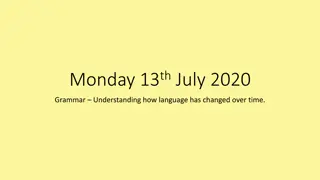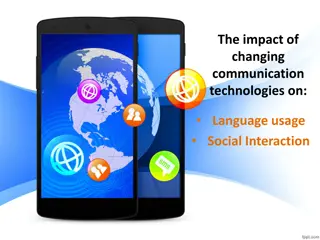Exploring the Concept of Dare in Language Usage
The concept of daring, both as a verb and a strong modal verb, is examined through examples and explanations. It delves into the use of "dare" to signify courage, challenge, and risk-taking in various contexts like discussions and debates.
Download Presentation

Please find below an Image/Link to download the presentation.
The content on the website is provided AS IS for your information and personal use only. It may not be sold, licensed, or shared on other websites without obtaining consent from the author. Download presentation by click this link. If you encounter any issues during the download, it is possible that the publisher has removed the file from their server.
E N D
Presentation Transcript
DARE (TO) GROUP K Michele Facchin, Camilla Milocco, Benedetta Rinaldi, Elena Saccon
DEFINITION AND EXAMPLES To be brave enough to do something difficult or dangerous, or to be rude or silly enough to do something that you have no right to do I'd never dare (to) talk to my mother the way Brandon talks to his. To ask someone to do something that involves risk I dare you to ask him to dance.
Normal verb and modal verb The peculiarity of the verb 'dare' is that it is used both as a normal verb (taking the auxiliary 'do' in the interrogative and negative forms, -s in the 3rd person singular and a to-infinitive) and as an anomalous verb (like other modal verbs, without do, s, and to ). As a normal verb it is usually used in the Past Tense. Compare: How did he dare to strike me? (normal verb) I did not dare to say a word. (normal verb) How dare you interrupt him? (modal verb) We dare not remain here. (modal verb)
Dare (to) in discussions and debates Dare (to) is a strong modal verb, and therefore it is rare to find it in business language. However, it can still be found in formal discussions and debates. I therefore find it incomprehensible that you can dare to submit a plan of non-action of this kind to this House http://www.europarl.europa.eu/sides/getDoc.do?pubRef=-//EP//TEXT+CRE+20050222+ITEMS+DOC+XML+V0//EN&language=EN Most of the new Member States are not yet ready for accession. Everyone knows that, but hardly anyone dares say so out loud. http://www.europarl.europa.eu/sides/getDoc.do?pubRef=//EP//TEXT+CRE+20040310+ITEMS+DOC+XML+V0//EN&language =EN























